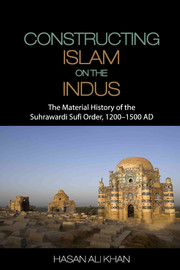Book contents
- Frontmatter
- Dedication
- Contents
- List of Figures
- Foreword
- Preface
- Acknowledgements
- Introduction
- 1 The Suhrawardi Order
- 2 Shams
- 3 The Suhrawardi Order in Uch
- 4 The Wilayat of 'Ali in Twelver Shi'ism, Sufism and the Religion of the Medieval Isma'ilis
- 5 Multan
- 6 The Da'wa and Suhrawardi Monuments at Uch
- Conclusion
- Glossary
- Notes on Referencing
- Bibliography
- Interviews and Fieldwork
- Appendices
- Index
Foreword
Published online by Cambridge University Press: 05 September 2016
- Frontmatter
- Dedication
- Contents
- List of Figures
- Foreword
- Preface
- Acknowledgements
- Introduction
- 1 The Suhrawardi Order
- 2 Shams
- 3 The Suhrawardi Order in Uch
- 4 The Wilayat of 'Ali in Twelver Shi'ism, Sufism and the Religion of the Medieval Isma'ilis
- 5 Multan
- 6 The Da'wa and Suhrawardi Monuments at Uch
- Conclusion
- Glossary
- Notes on Referencing
- Bibliography
- Interviews and Fieldwork
- Appendices
- Index
Summary
In their rapid spread across Asia, Africa and southern Europe from the seventh century CE, Muslims came to work with many local cultures and local religious traditions. Often, Muslims came to express their faith through these local cultures, using local myths and local idioms to express their meaning. At other times, they might work closely with local traditions, fashioning a multi-faith harmony. Sufis were usually at the forefront of the process of interaction; their success was, to a large extent, measured by the number of local supporters they could attract. Theoretical underpinning for the process was found in Ibn al-'Arabi's idea of wahdat al-wujud (the unity of being) which spread rapidly from the thirteenth century. At times, the shari'a-minded found fault with these local expressions of Islam, declaring them to be shirk or rejections of the oneness of God. But the shari'a-minded were relatively few and local expressions of Islam were usually powerfully intertwined with local social and political power. For the greater part of Muslim history, Islam was expressed through local cultures and in harmony with them.
From the eighteenth century, the manner of Muslim engagement with local religious traditions came increasingly to be challenged. The source was the great movement of revival and reform which spread throughout the Islamic world, its main starting points being the teaching of Muhammad Ibn ‘Abd al-Wahhab (1703–1792) in Arabia and Shah Wali Allah (1703–1762) in South Asia. Among the targets of this movement were all forms of behaviour that could be interpreted as challenging the oneness of God: the worship of trees or stones, the following of customs which had no sanction in Islamic law. A common battleground was behaviour at saints’ shrines; no one should behave in a way which suggested they were worshipping the saint. At its extreme, the movement of reform became opposed to Sufism itself. Debates about the interpretation of Ibn al'Arabi became more frequent. Reformed Islam became increasingly exclusive rather than inclusive. The process of reform, in various manifestations, has continued down to the present.
Hasan Ali Khan is concerned to lay before us the world of inclusive and pluralistic religious practice which existed in the Indus Valley up to recent times.
- Type
- Chapter
- Information
- Constructing Islam on the IndusThe Material History of the Suhrawardi Sufi Order, 1200–1500 AD, pp. xv - xviiiPublisher: Cambridge University PressPrint publication year: 2015
- 2
- Cited by



